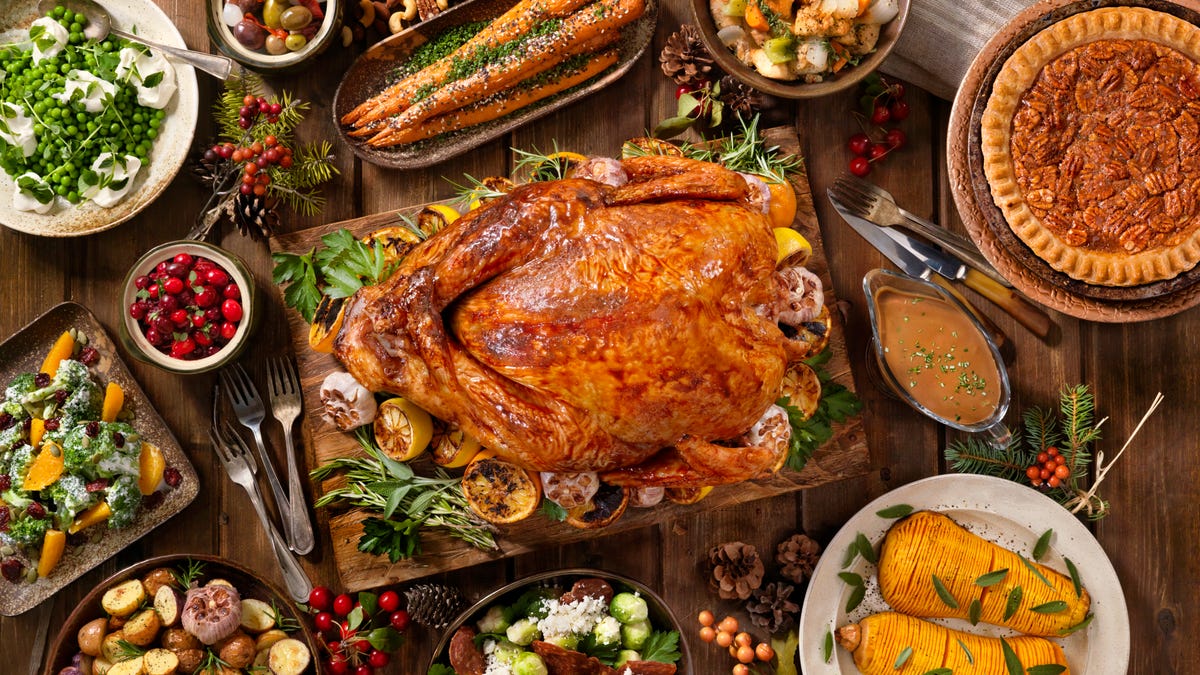 Why You Can Trust CNET
Why You Can Trust CNET Craving a Post-Dinner Nap on Thanksgiving? This Is Why Meals Make You Sleepy
Yes, turkey makes you sleepy, but these foods are also to blame.

Turkey remains the star of a typical Thanksgiving spread, as around 46 million turkeys are consumed each Thanksgiving. Buttery mashed potatoes and assortments of pies are also popular menu items for the holiday, and complete a delicious meal a lot of us wait 354 days for. Though, there's something about a Thanksgiving food coma that makes you feel extra sleepy.
The official term is "postprandial somnolence," aka a food coma, and it's a common phenomenon caused by numerous factors -- one of which is the perfectly sleep-inducing combination of turkey and other popular menu items. Continue reading to find out why you get extra sleepy after eating a Thanksgiving meal and how to avoid an involuntary after-dinner nap this holiday.
Turkey, other Thanksgiving foods make you sleepy
Turkey is the most well-known culprit behind Thanksgiving sleepiness because it contains a fair amount of the large amino acid tryptophan. Humans already have a significant amount of tryptophan in the bloodstream (along with other large amino acids), which is converted to serotonin in the brain -- a neurotransmitter responsible for making you feel tired. That said, turkey alone isn't enough to send you into a slumber.
Carbohydrates from your mashed potatoes, pumpkin pie, stuffing and dinner rolls are also to blame in this equation. In fact, without those delicious but starchy sides, the turkey would have little effect on your lethargy. When you consume carbs, your pancreas releases insulin and in turn, the large amino acids in your blood levels are lowered, with the exception of tryptophan. As a result, the carbs intensify the power of the tryptophan and trigger you to feel drowsy.
However, it's not all about what you eat. Food-induced sleepiness also has to do with the amount you consume on Thanksgiving relative to your usual serving sizes.
Overeating can also make you feel tired
Turkeys aren't the only things getting stuffed on Thanksgiving, but eating bigger portions over the holiday than you're typically used to is also a contributing factor to your sleepiness. The more you eat, the more blood has to be sent to your stomach and intestines to help your body digest the food. This leaves less blood throughout the rest of your body, leaving you feeling tired after a large meal.
There's also evidence that the gut-brain axis, rather than the redistribution of blood flow, plays an important role in triggering a food coma. After you eat, your gut secretes hormones like melatonin and orexins that lower your heart rate and put you into a "rest and digest" state, rather than "fight or flight" state.
How to avoid a nap on Thanksgiving
There's nothing wrong with enjoying those post-dinner naps while you can -- holidays are for rest, after all. But if you need to stay awake for a second Thanksgiving celebration with another side of the family or you generally want to avoid late-day naps, here are a few tips.
1. Eat more protein: Protein has the opposite effect of carbs in that it raises all the amino acid levels in your blood, minimizing the effect of tryptophan. So this year, reach for extra protein and vegetables at the dinner table rather than mashed potatoes (as hard as that might be).
2. Eat comfortable portions: Try not to overstuff yourself with dinner and dessert -- instead, eat until you're comfortably full and satiated. Remember, next-day Thanksgiving leftovers are just as good as the first time around.
3. Take a post-dinner walk: Not only does physical activity boost your energy, but taking a walk after your Thanksgiving meal can help your body digest. The majority of the digestion process occurs in your small intestine, and a walk helps transport the food from your stomach into your intestine quicker.
For more nap talk, learn how to take a refreshing nap in four steps and how to make the most out of your nap.
Tryptophan can also be found in these foods
Interestingly enough, turkey -- compared to other foods -- isn't even that high in tryptophan. Here's a list of other tasty foods that contain the sleep-promoting amino acid.
- Chicken
- Lamb
- Tuna
- Shrimp
- Pumpkin seeds
- Cheese
- Soy sauce
- Spinach
- Eggs
- Halibut
- Salmon
- Crab

